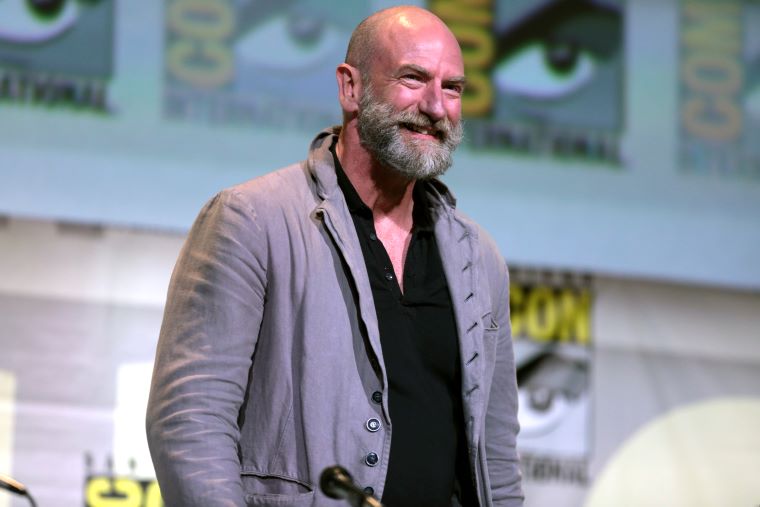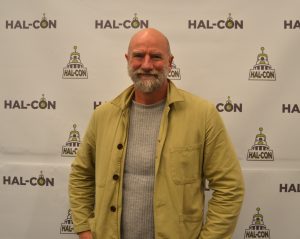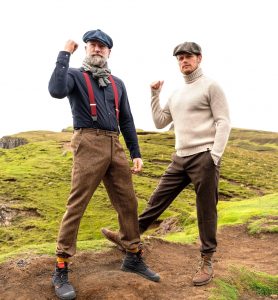
After a few years where events were either reduced in scope or outright cancelled due to the ongoing COVID-19 pandemic, Halifax’s local pop culture convention – Hal-Con – recently returned to full form. Organizers pulled out all the stops, gathering big names to meet their Nova Scotian fans, including Outlander/Men in Kilts actor Graham McTavish. Celtic Life International recently sat down with the Scottish thespian for an exclusive, in-person chat.
What do you think of the Hal-Con convention so far?
It is a great convention – really well done, nice and busy. It is lovely to see people all together again – you know, human connections and all that stuff. The costumes have been quite impressive, and there seems to be a lot of people putting a lot of effort into it.
How did you end up coming to Halifax for Hal-Con?
I was invited to Halifax, and I have always wanted to visit, so I jumped at the opportunity to come here. I have never been to this part of Canada. I grew up for three years in Vancouver, but we never made it over this far. And I am surprised at the number of people that live on this side of the country who have never been to British Columbia.
Do you do a lot of conventions like this?
I started years ago when we were doing The Hobbit, and I have since attended quite a few in a variety of places. I did one very recently in North Carolina, which was an Outlander event, and that was fantastic. And they vary hugely; some are small and quite intimate, some are in beautiful exotic locations, some are in not-so-beautiful exotic locations, and some are really huge. However, they are all interesting, because the one thing that that unites all of those experiences is that everyone who attends wants to be there – all the fans, all the people that come and spend their hard-earned money to go to these places. I never see an unhappy person at a convention. I see tired people, of course – especially children – but I never see unhappy people.

Tell us more about this Outlander convention in North Carolina.
That event took place near the location of where Fraser’s Ridge is set in the Outlander books and the series. They call it the Fraser’s Ridge Homecoming, and this year there was about 200 people there. It’s great – there is a bit of a dance, there are bands, and I do autographs and photos and all the rest of it. And it was a lovely, contained environment, and very beautiful.
The fan response to Outlander has been simply incredible.
Yes, it is. It is very popular. I mean, more popular than I think any of us could have imagined, really, especially when we were making it, as we live in a bit of a bubble when we are making TV shows. It was the same with House of the Dragon, and The Hobbit, and The Witcher. We just live in those worlds, surrounded by the people that we work with. We don’t really have a feeling of what it is going to be like. So, the Outlander phenomenon has had enormous benefits for the Scottish tourist trade – which is up some gigantic figure – thanks to Outlander. It’s great that we are bringing Scotland to people and reconnecting them with their Scottish roots. The number of people I have spoken to who have never been to Scotland before, and have gone purely because of Outlander, is amazing.
Do you think Celtic culture is permeating into popular culture more?
Yes, I believe it is, and I think that sometimes people don’t necessarily recognize the influence of Celtic culture in all those shows. I mean, Sam (Heughan) and I did Men in Kilts, which was a celebration of Scottish culture. We have just done another one set in New Zealand, which is an exploration of the Scottish influence there. It’s definitely becoming more and more mainstream. And the kind of things that influence those television programs – those sorts of semi-mythic worlds that are created – have their roots in Celtic mythology and legend. All the descriptions of dragons and all the rest, you can discover all of those within the mythology of the Celts. Sometimes deliberate, I think; sometimes, by accident.
And can fantasy and fiction be a good gateway to learn about Celtic culture?
Yes, that is what happens. People watch a show like Outlander and get caught up in a somewhat romantic view of Scotland. But that leads them to explore not just their own Scottish roots, but the history of that country and the truth about the country, which in-and-of-itself is fascinating. I mean, a lot of people have started learning Gaelic because of Outlander. And it has regenerated all sorts of cottage industries in Scotland. You know, there is a woollen mill down in Selkirk, I think, who make the plaids for Outlander that are doing great guns. So yes, it has been a kind of a gateway.
Do you feel like that helps people discover their own diaspora?
It really does. You know, I am really interested in Nova Scotia, for instance. How these people came here, and why they came here. And there might be a very simplistic version of all those things – just you start to dig away at the truth and really look at the desperation of some of these people would have had to have taken that journey. Because now, of course, we think of Nova Scotia is a beautiful destination to go and visit as a tourist. But the original settlers weren’t tourists – this was frontier land, and they had to say goodbye to their homeland forever. We look at it with a modern sensibility of travel, which is such a recent thing – the idea of traveling for pleasure.  People never travelled for pleasure in the past. They only traveled if they had to. And so, the idea of traveling across an ocean to set up an entirely new life would have been terrifying. That is something that I like to explore personally – the why and the how and what those people and their experiences were really like. It is difficult to get into their minds – you know, like a family of eight people sailing on a boat for days or weeks, going through all sorts of danger. I’ve been researching stuff about immigration to New Zealand. I mean, that was gigantic. It just went on and on and on. And if you were travelling in steerage on one of these boats, you were basically soaking wet the entire time. Your mattress, everything, would be soaking wet. That level of discomfort and struggle is something that I find terribly interesting. And anybody who is a descendant of those people owes their life to those that went through that.
People never travelled for pleasure in the past. They only traveled if they had to. And so, the idea of traveling across an ocean to set up an entirely new life would have been terrifying. That is something that I like to explore personally – the why and the how and what those people and their experiences were really like. It is difficult to get into their minds – you know, like a family of eight people sailing on a boat for days or weeks, going through all sorts of danger. I’ve been researching stuff about immigration to New Zealand. I mean, that was gigantic. It just went on and on and on. And if you were travelling in steerage on one of these boats, you were basically soaking wet the entire time. Your mattress, everything, would be soaking wet. That level of discomfort and struggle is something that I find terribly interesting. And anybody who is a descendant of those people owes their life to those that went through that.
Have you had any time to explore Nova Scotia?
Not at all, I’m afraid. I mean, the plus side of doing a convention like this is you get to meet the people; however, the downside is that you often don’t get out to see the place. So, I will have to come back separately to explore. I mean, Canadians are lovely people, and this area has its own particular character which I like – people that live on the edge of country are always unique and interesting.
Can you tell us about the upcoming season of Men in Kilts in New Zealand?
Well, Sam and I wanted to do the next season of Men in Kilts, and we didn’t want to set it in Scotland itself, but rather places that had come under the influence of Scotland. New Zealand was a really obvious candidate, partly because I have spent significant time there. We were able to go the length and breadth of the country. Sam seems determined to terrorize me at every opportunity, an. I am beginning to think that it is less about Scottish culture and more about, “let’s frighten Graham.” so we did some we did some pretty crazy things in New Zealand, which you will certainly see in the show.




















Leave a Comment